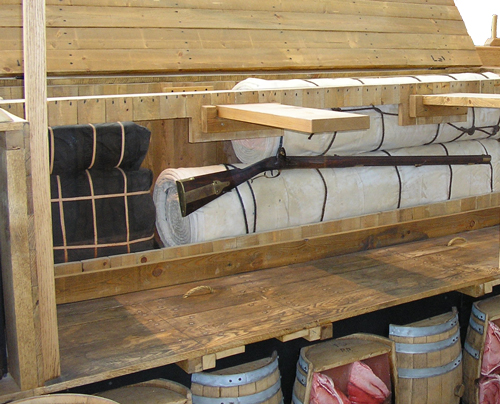At Fort Mandan amongst the Knife River Villages, the barge is loaded and made ready for its return to St. Louis. It is too windy to load the pirogues for their journey up the river. Canadian traders François-Antoine Larocque and Charles McKenzie say their final goodbyes. Years later, McKenzie writes his recollections of the expedition.
Trying to Leave Fort Mandan
by Yellowstone Public Radio[1]Originally aired weekdays by Yellowstone Public Radio during the Bicentennial observance of 2003-2006. Narrated by Hal Hansen. Scripts by Whit Hansen and Ed Jacobson. Produced by Leni Holliman. © … Continue reading
Barge Cargo (Replica)
Provided by the U.S. Army Center of Military History, www.history.army.mil/LC/The%20Mission/KeelboatPhotos/keelboat_photos.htm.
Loading the Barge
the Indian Goods and bags of corn all put out to air. the articles for St. Louis carred on board the barge ready to Set out but the wind blew high from the N. W. so we did not load the perogues.
—John Ordway
McKenzie’s Recollections
Clark states that François-Antoine Larocque and Charles McKenzie left Fort Mandan on 4 April 1805 for the last time. Circa 1809–10, McKenzie formalized his recollections of his four trips to the Knife River Villages. Regarding his relations with the Lewis and Clark Expedition, he wrote:
Mr. La Roque and I having nothing very particular claiming attention, we lived contented and became intimate with the Gentlemen of the American expedition; who on all occasions seemed happy to see us, and always treated us with civility and kindness. It is true Captain Lewis could not make himself agreeable to us—he could speak fluently and learnedly on all subjects, but his inveterate disposition against the British stained, at least in our eyes, all his eloquence. Captain Clark was equally well informed, but his conversation was always pleasant, for he seemed to dislike giving offence unnecessarily.—
—Charles McKenzie[2]W. Raymond Wood and Thomas D. Thiessen, Early Fur Trade on the Northern Plains: Canadian Traders among the Mandan and Hidatsa Indians, 1738–1818 (Norman: University of Oklahoma Press, 1985), 223, … Continue reading
Apparently, Clark left quite a different impression with a majority of voters in the new State of Missouri, when he sought election to the office of governor in 1820. John O’Fallon commented on Uncle William’s status among the electorate in a letter to his cousin, Dennis Fitzhugh: “They accuse Governor Clark of . . . being stiff and reserved and unhospitable.”[3]Cited in Jerome O. Steffen, William Clark: Jeffersonian Man on the Frontier (Norman: University of Oklahoma Press, 1977), p. 176, note 59.
Related: Larocque at Fort Mandan | The Fur Trade
Weather Diary
State of Thermometer at rise
Weather Wind at rise
State of Thermometer at 4 P.M. Weather Wind at 4 P.M. State of the River 36 [above 0] fair S. 55 [above 0] fair N. W. fallen 4 in. Observed a flock of brant passing up the river today; the wind blew very ha[r]d as it dose frequently in this quarter; there is sarcely any timber to brake the wind from the river, & the country on both sides being level plains, wholy destitute of timber, the wind blows with astonishing violence. in this open country the winds form a great obstruction to the navigation of this river particularly with small vessels, which can neither ascend or descend should the wind be the least violent.—
—William Clark and Meriwether Lewis[4]To assist the reader, the editor of this web page has omitted the date column, clarified the “State of the River” information, and spelled out some abbreviations.
Fort Mandan is a High Potential Historic Site along the Lewis and Clark National Historic Trail managed by the U.S. National Park Service. The North Dakota Department of Parks and Recreation manages a modern reconstruction and the Lewis and Clark Interpretive Center located at US Hwy 83 and ND Hwy 200A.
Knife River Indian Villages National Historic Site is a High Potential Historic Site along the Lewis and Clark National Historic Trail managed by the U.S. National Park Service. A unit of the National Park System, the site is located at 564 County Road 37, one-half mile north of Stanton, North Dakota. It has exhibits, trails, and a visitor center.
Notes
| ↑1 | Originally aired weekdays by Yellowstone Public Radio during the Bicentennial observance of 2003-2006. Narrated by Hal Hansen. Scripts by Whit Hansen and Ed Jacobson. Produced by Leni Holliman. © 2003 by Yellowstone Public Radio. |
|---|---|
| ↑2 | W. Raymond Wood and Thomas D. Thiessen, Early Fur Trade on the Northern Plains: Canadian Traders among the Mandan and Hidatsa Indians, 1738–1818 (Norman: University of Oklahoma Press, 1985), 223, 238. |
| ↑3 | Cited in Jerome O. Steffen, William Clark: Jeffersonian Man on the Frontier (Norman: University of Oklahoma Press, 1977), p. 176, note 59. |
| ↑4 | To assist the reader, the editor of this web page has omitted the date column, clarified the “State of the River” information, and spelled out some abbreviations. |



